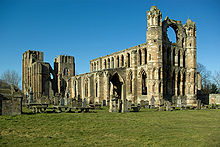Elgin Cathedral
| Elgin Cathedral | |
|---|---|
 |
|
| Location | Elgin, Moray |
| Country | Scotland |
| Denomination | Roman Catholic |
| History | |
| Authorising papal bull | 10 April 1224 |
| Founded | fl. c. 1120–1127x1131 1224 (in present location) |
| Founder(s) | Bishop Andreas de Moravia |
| Dedication | The Holy Trinity |
| Dedicated | 19 July 1224 |
| Events | Cathedral and chanonry damaged by fire – in 1270, 1390 and 1402 |
| Associated people |
King Alexander II Alexander Stewart, Earl of Buchan Alexander Gordon, 1st Earl of Huntly John Shanks |
| Architecture | |
| Functional status | Ruin |
| Architectural type | Cathedral |
| Style | Gothic |
| Administration | |
| Deanery | Elgin Inverness Strathspey Strathbogie |
| Diocese | Moray (est. x1114–1127x1131) |
| Clergy | |
| Bishop(s) |
(Of significance) |
| Designated | 6 February 1995 |
| Reference no. | 90142 |
| Category | Ecclesiastical |
|
Listed Building – Category A
|
|
| Designated | 26 January 1971 |
| Reference no. | 30853 |
(Of significance)
Bricius de Douglas
Andreas de Moravia
Alexander Bur
Patrick Hepburn
Elgin Cathedral is a historic ruin in Elgin, Moray, north-east Scotland. The cathedral—dedicated to the Holy Trinity—was established in 1224 on land granted by King Alexander II outside the burgh of Elgin and close to the River Lossie. It replaced the cathedral at Spynie, 3 kilometres (1.9 mi) to the north, that was served by a small chapter of eight clerics. The new and bigger cathedral was staffed with 18 canons in 1226 and then increased to 23 by 1242. After a damaging fire in 1270, a rebuilding programme greatly enlarged the building. It was unaffected by the Wars of Scottish Independence but again suffered extensive fire damage in 1390 following an attack by Robert III's brother Alexander Stewart, Earl of Buchan, also known as the Wolf of Badenoch. In 1402 the cathedral precinct again suffered an incendiary attack by the followers of the Lord of the Isles. The number of clerics required to staff the cathedral continued to grow, as did the number of craftsmen needed to maintain the buildings and surrounds. The number of canons had increased to 25 by the time of the Scottish Reformation in 1560, when the cathedral was abandoned and its services transferred to Elgin's parish church of St Giles. After the removal of the lead that waterproofed the roof in 1567, the cathedral steadily fell into decay. Its deterioration was arrested in the 19th century, by which time the building was in a substantially ruinous condition.
...
Wikipedia
